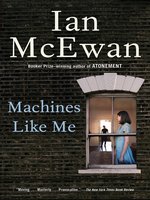-

February 11, 2019
McEwan’s thought-provoking novel (after Nutshell) is about the increasingly fraught relationship between a man, a woman, and a synthetic human. Opening in an alternate 1982 London in which technology is not dissimilar from today’s (characters text and send emails), 32-year-old Charlie spends £86,000 of his inheritance on the “first truly viable manufactured human with plausible intelligence and looks,” who can pass for human unless closely inspected. His name is Adam (there are 12 Adams and 13 Eves total; the Eves sell out first), and Charlie designs Adam’s personality along with his neighbor and girlfriend Miranda. Soon, Adam informs Charlie that he “should be careful of trusting her completely,” and quickly falls in love with her, thus inextricably binding their fates together. The novel’s highlight is Adam, a consistently surprising character who quickly disables his own kill switch and composes an endless stream of haiku dedicated to Miranda because, as he states, “the lapidary haiku, the still, clear perception and celebration of things as they are, will be the only necessary form” as misunderstanding is eradicated in the future. The novel loses steam when Adam’s not the focus: much page space is devoted to a thread about an orphan boy, as well as Charlie’s thoughts and feelings about Miranda. Though the reader may wish for a tighter story, this is nonetheless an intriguing novel about humans, machines, and what constitutes a self.
-

February 15, 2019
The British author's latest novel concerns a triangle formed by two humans and one android in an alternate version of England.The year is 1982, the British are about to lose the Falklands War, and Alan Turing is not only still alive, but his work has helped give rise to a line of androids almost indistinguishable from humans. The narrator, Charlie Friend, an aimless 32-year-old, inherits enough money to buy one of the pricey robots. He and Miranda, the younger woman living above him, each supply half the "personality parameters" required to push Adam past his factory presets. Before long, as things between the humans seem to be getting serious, Charlie finds himself the first man "to be cuckolded by an artefact." They all survive the fling, although Charlie imagines he detects "the scent of warm electronics on her sheets," and Adam turns lovesick, composing 2,000 haiku for Miranda (namesake of the Bard's character who famously utters: "O brave new world, / That has such people in't"). Early on, the android has told Charlie that Miranda is a liar and might harm him without providing details. These statements flag a fateful backstory comprising a teenage Miranda, two schoolmates, and a death threat. Along the way to a busy and disturbing ending, Charlie makes a connection with Turing that allows for some nerd-pleasing kibble like "non-deterministic polynomial time." McEwan (Nutshell, 2016, etc.) brings humor and considerable ethical rumination to a cautionary tale about artificial intelligence. But his human characters seem unfinished, his plot a bit ragged. And why the alternate 1982 England, other than to fire a few political shots about the Falklands, Thatcher, and Tony Benn? Does the title make sense as either clause or complete sentence? Are we meant to imagine the "real" author as a present-day Adam?McEwan is a gifted storyteller, but this one is as frustrating as it is intriguing.
COPYRIGHT(2019) Kirkus Reviews, ALL RIGHTS RESERVED.
-

March 1, 2019
As in McEwan's previous novel, Nutshell (2016), told from the point of view of a fetus, this much-revered writer again stretches himself. Here he imagines an alternate history in which technology advanced much faster than in real time, and the great polymath Alan Turing lived much longer. The narrator, Charlie, lives in south London in the 1980s, and he decides to invest his sizable inheritance in an Adam, one of the first fully conscious androids. Charlie and his much younger girlfriend, Miranda?a stupendous creation?navigate this new world together, and as Adam struggles with what he is, McEwan explores complex themes of consciousness, being, and self as well as the impact Adam's existence has on Charlie and Miranda. While the alternate history is at times clunky and distracting, the comparisons between contemporary British politics and the 1980s are apt. McEwan makes an odd but inventive premise work spectacularly well; it enables him to explore nearly every hot-button issue, and it is fascinating to witness one of the finest living novelists delve into topics of such pertinence and complexity.HIGH-DEMAND BACKSTORY: McEwan's literary audaciousness ensures ongoing, elevated interest in each new book.(Reprinted with permission of Booklist, copyright 2019, American Library Association.)
-

November 15, 2018
In 1980s London, Charlie longs for mysterious upstairs neighbor Miranda but contents himself with spending his inheritance on one of the 24 beautiful new robotic humans, named Adam or Eve, created by Alan Turing after his World War II triumph with the Enigma code-breaking machine. Charlie's Adam figures in his courtship of Miranda, as protests against Margaret Thatcher's policies rage. Alternate history from the multi-award-winning McEwan.
Copyright 2018 Library Journal, LLC Used with permission.








